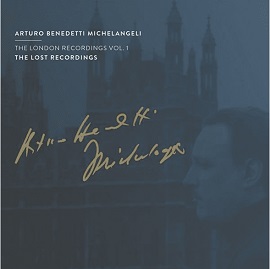Arturo Benedetti Michelangelis Aufnahme des G-Dur-Konzerts von Ravel mit dem Philharmonia Orchestra unter Ettore Gracis ist eine der besten dieses Werks. Nun bekommt die Einspielung Konkurrenz von Michelangeli selber, in einer funkelnden Liveaufnahme mit dem LSO unter Sergiu Celibidache.
Schon in der Gracis-Aufnahme war der italienische Pianist unübertroffen wegen seines rhythmischen Gefühls, seiner Detailgenauigkeit und vor allem wegen seiner Nuancen, seines genialen Farbenreichtums und letztlich auch der Logik aller künstlerischen Entscheidungen. Der langsame Satz ist ausdrucksvoll, ohne sentimental zu werden und das Finale ist virtuos und höchst intensiv, ohne hektisch zu sein.
Celibidache inspiriert das London Symphony Orchestra zu einem spannungs- und effektvollen Musizieren von schillernder Brillanz.
Eine fantastische Interpretation von Ravels Gaspard de la Nuit folgt auf das Konzert. Benedetti Michelangeli spielt Ondine schnell (in sechs Minuten) und mit unnachahmlicher Präzision und Farbnuancen. Le Gibet ist düster und dämonisch, und auch Scarbo ist mit einer einmaligen Färbungstechnik, einer großen Klarheit und einer packenden Innenspannung absolut grandios.
Die 2. CD beginnt mit einer stupend kontrollierten und wunderbar ausgewogenen Clementi-Sonate, ehe uns der Pianist auf eine phänomenale Chopin-Reise mitnimmt. Es ist eine der eigenartigsten und persönlichsten Interpretationen dieser Sonate, die ich je gehört habe. Die Kraft ist nie bloß Kraft, sie kann erregt oder auch dämonisch sein, ja direkt angsteinflößend, die Intensität ist mürrisch oder auch grüblerisch, manchmal mit aufbrausenden Akzentuierungen. Auch das Scherzo ist in seiner Differenzierung der Stimmungen absolut hinreißend, während der Trauermarsch von einer eigenartigen Mischung von Gefühlen geprägt ist, unter denen die Sehnsucht besonders stark zum Ausdruck kommt. Das Presto beschließt die Sonate in schnellen 75 Sekunden in einem Rausch der ausweglosen Hoffnungslosigkeit.
Arturo Benedetti Michelangeli’s recording of Ravel’s G major Concerto with the Philharmonia Orchestra under Ettore Gracis is one of the best of this work. Now the recording gets competition from Michelangeli himself, in a sparkling live recording with the LSO under Sergiu Celibidache.
Already in the Gracis recording, the Italian pianist was unsurpassed for his rhythmic feeling, his attention to detail and, above all, for his nuances, his brilliant richness of color and, ultimately, the logic of all artistic decisions. The slow movement is expressive without being sentimental and the finale is virtuosic and highly intense without being hectic.
Celibidache inspires the London Symphony Orchestra to music-making of dazzling brilliance that is full of tension and effects.
A fantastic interpretation of Ravel’s Gaspard de la Nuit follows the concerto. Benedetti Michelangeli plays Ondine quickly (in six minutes) and with inimitable precision and nuance of color. Le Gibet is somber and demonic, and Scarbo is also absolutely terrific with a unique coloring technique, great clarity and gripping inner tension.
The 2nd CD begins with a stupendously controlled and wonderfully balanced Clementi Sonata before the pianist takes us on a phenomenal Chopin journey. It is one of the strangest and most personal interpretations of this sonata I have ever heard. The power is never merely power; it can be agitated or demonic, even outright frightening; the intensity is sullen or brooding, sometimes with incendiary accents. The Scherzo, too, is absolutely ravishing in its differentiation of moods, while the Funeral March is marked by a peculiar mixture of emotions, among which longing is especially strongly expressed. The Presto concludes the sonata in a fast 75 seconds in a rush of hopeless hopelessness.




















